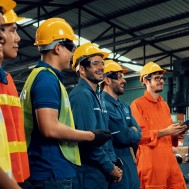Rubber products are incredibly valuable, as are the people who create and innovate them. The rubber industry offers many interesting career opportunities. From chemists and equipment operators to scientists and engineers to quality control personnel — there just might be a career in the rubber industry that’s the right fit for you.
Who works in the rubber industry?
Creative, analytical, dedicated problem solvers can find a lot of satisfaction working in the rubber industry. Every day, your work goes toward solving problems, improving products, and creating new materials. Since new technology is constantly being developed, there are always opportunities to develop your skills through on-the-job training and new experiences.
Within the rubber industry, you can find a niche and build a career based on your interests. Rubber parts are essential for all industries: medical devices, automotive, aerospace, power generation, and national defense. For example, those interested in flight and space travel could consider a career developing polymers.
Some job titles in the rubber industry include:
Polymer Engineer
What they do: A polymer engineer usually works in rubber formulation, creating and testing new rubber compounds. Their responsibilities include fabricating new polymers, working with prototypes, and designing material processing equipment. Polymer engineers also analyze new rubber base polymers, fillers, curatives, and protectants, so they need to stay up to date on the latest developments in their field.
How to become one: First, you’ll need to earn a bachelor’s degree in polymer science or materials or chemical engineering (and consider getting a master’s degree too). These degree programs prepare you for this career by teaching skills like mathematics, chemistry, and polymer analysis, processing, and production.
R&D Engineer
What they do: An R&D engineer performs research and development. They use research theories, principles and models to conduct various experiments, create new products, and redesign old products. Their overall goal is to improve their company’s technologies and contribute to the overall industry.
How to become one: You’ll need to earn a Bachelor’s Degree in Engineering or a similar field, and possibly a license through the National Council of Examiners for Engineering and Surveying (NCEES).
Engineering Supervisor
What they do: The engineering supervisor is responsible for overseeing operations in the engineering department. They oversee operation budgets, project goals, specifications, and regulations. They also make sure that their equipment is always running properly by keeping up with tasks like parts procurement, calibration, and permit maintenance.
How to become one: For this position, you’ll need to have at least a bachelor’s degree in an engineering field. You’ll also need to gain at least three years of engineering work experience, and pick up some communication, mechanical, and problem-solving skills along the way.
Quality Control Supervisor
What they do: Quality control supervisors are responsible for all aspects of quality control in an organization. This means supervising the quality control department and ensuring that their team follows all the rules for handling quality control issues.
How to become one: Depending on where you want to work, you’ll need either a high school diploma or a bachelor’s degree. In addition to education, most employers look for candidates with 2-5 years of relevant experience and skills like reading specifications, monitoring operations, inspecting, testing, and reporting data.
Interested in working in the rubber industry?
Contact us today.
